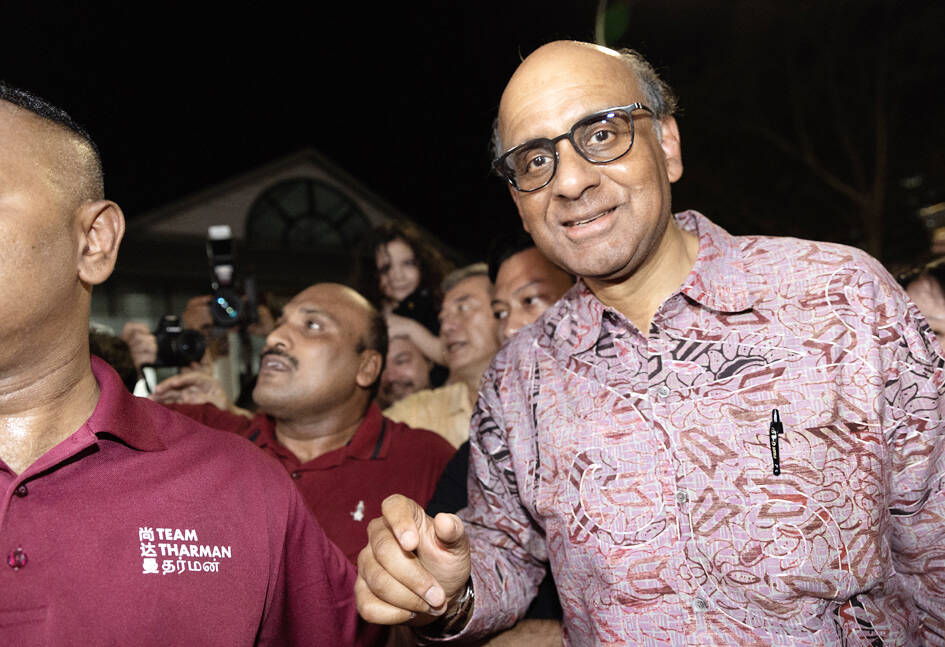Former Singaporean deputy prime minister Tharman Shanmugaratnam was elected president on Friday, earning a landslide victory in the city-state’s first contested vote for the largely ceremonial position in more than a decade.
Singaporeans headed to the polls that were closely watched as an indication of support for the ruling party after a rare spate of scandals, but the longtime stalwart of the party won more than two-thirds of the vote over two rivals.
“I believe that it’s a vote of confidence in Singapore. It’s a vote of optimism for a future in which we can progress together and support each other as Singaporeans,” said Shanmugaratnam, who is also the city-state’s former finance minister, in a speech before the results were announced. “I’m humbled by this vote. It is not just a vote for me, it is a vote for Singapore’s future.”

Photo: EPA-EFE
He won 70.4 percent of the vote to win a six-year term.
His main rival, Ng Kok Song (黃國松), a former chief investment officer of the Government of Singapore Investment Corp (GIC), which manages the country’s foreign reserves, conceded after winning only 15.7 percent of the vote.
“The result is clear,” he told reporters, adding Shanmugaratnam “has indeed earned a mandate from the people of Singapore.”
Shanmugaratnam acknowledged the “changing and evolving” nature of Singapore, notably its diversity, and said he believes the election was seen as “another milestone in that process of evolution.”
There are stringent requirements for the position, which formally oversees the city’s accumulated financial reserves and holds the power to veto certain measures and approve anti-graft probes.
While the presidency is a non-partisan post under the constitution, political lines had already been drawn ahead of the election to replace incumbent Halimah Yacob, who ran unopposed for her six-year term in 2017.
Shanmugaratnam was viewed as the favorite for the position and had resigned as a member of Singapore’s ruling People’s Action Party (PAP) and as a senior minister in the cabinet ahead of the election as all presidential candidates must be independent.
The 66-year-old economist is said as having the government’s backing and was questioned about his independence during the campaign.
The city-state’s government is run by the prime minister, currently Lee Hsien Loong (李顯龍) of the PAP, which has ruled Singapore continuously since 1959.
“Singaporeans have chosen Mr Tharman Shanmugaratnam to be our next president by a decisive margin,” Lee said in a statement. The US sent a congratulatory message to Shanmugaratnam that pointed to “mutual respect, shared values and common interests” with Singapore.
Observers said the vote would indicate the level of PAP support ahead of general elections due in 2025 or discontent after recent scandals that include a corruption probe into the city-state’s transport minister and the resignations of two PAP legislators over an affair.
Another candidate, former insurance executive Tan Kin Lian (陳欽亮), 75, had gained the support of several opposition leaders, but only picked up 13.88 percent of votes.

Kehinde Sanni spends his days smoothing out dents and repainting scratched bumpers in a modest autobody shop in Lagos. He has never left Nigeria, yet he speaks glowingly of Burkina Faso military leader Ibrahim Traore. “Nigeria needs someone like Ibrahim Traore of Burkina Faso. He is doing well for his country,” Sanni said. His admiration is shaped by a steady stream of viral videos, memes and social media posts — many misleading or outright false — portraying Traore as a fearless reformer who defied Western powers and reclaimed his country’s dignity. The Burkinabe strongman swept into power following a coup in September 2022

‘FRAGMENTING’: British politics have for a long time been dominated by the Labor Party and the Tories, but polls suggest that Reform now poses a significant challenge Hard-right upstarts Reform UK snatched a parliamentary seat from British Prime Minister Keir Starmer’s Labor Party yesterday in local elections that dealt a blow to the UK’s two establishment parties. Reform, led by anti-immigrant firebrand Nigel Farage, won the by-election in Runcorn and Helsby in northwest England by just six votes, as it picked up gains in other localities, including one mayoralty. The group’s strong showing continues momentum it built up at last year’s general election and appears to confirm a trend that the UK is entering an era of multi-party politics. “For the movement, for the party it’s a very, very big

ENTERTAINMENT: Rio officials have a history of organizing massive concerts on Copacabana Beach, with Madonna’s show drawing about 1.6 million fans last year Lady Gaga on Saturday night gave a free concert in front of 2 million fans who poured onto Copacabana Beach in Rio de Janeiro for the biggest show of her career. “Tonight, we’re making history... Thank you for making history with me,” Lady Gaga told a screaming crowd. The Mother Monster, as she is known, started the show at about 10:10pm local time with her 2011 song Bloody Mary. Cries of joy rose from the tightly packed fans who sang and danced shoulder-to-shoulder on the vast stretch of sand. Concert organizers said 2.1 million people attended the show. Lady Gaga

SUPPORT: The Australian prime minister promised to back Kyiv against Russia’s invasion, saying: ‘That’s my government’s position. It was yesterday. It still is’ Left-leaning Australian Prime Minister Anthony Albanese yesterday basked in his landslide election win, promising a “disciplined, orderly” government to confront cost-of-living pain and tariff turmoil. People clapped as the 62-year-old and his fiancee, Jodie Haydon, who visited his old inner Sydney haunt, Cafe Italia, surrounded by a crowd of jostling photographers and journalists. Albanese’s Labor Party is on course to win at least 83 seats in the 150-member parliament, partial results showed. Opposition leader Peter Dutton’s conservative Liberal-National coalition had just 38 seats, and other parties 12. Another 17 seats were still in doubt. “We will be a disciplined, orderly